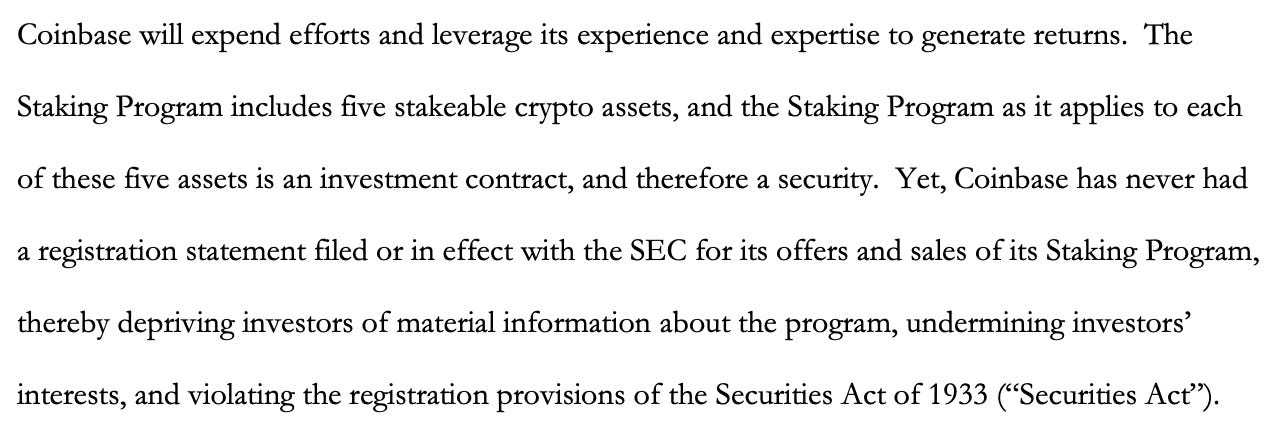DeFi: Coinbase new institutional crypto lending service; MakerDAO Solana fork as appchain
In response to Christensen's proposal, Vitalik Buterin liquidated his remaining MKR tokens, and Coinbase saw a nearly 60% drop in transaction fee revenue
The Fintech Blueprint is a newsletter authored by me, Lex Sokolin, and a small group of brilliant researchers who focus on frontier technologies impacting the future of financial services. I am glad you are here. Was this email forwarded to you? You deserve your own:
👉subscribe here.
Gm Fintech Futurists —
Today we highlight the following:
PROTOCOLS: MakerDAO Co-founder Proposes Fork Of Solana Codebase For Native Chain (link here)
INSTITUTIONAL ADOPTION: Coinbase Creates New Crypto Lending Service Geared Toward US Institutions (link here)
CURATED UPDATES
To support this writing and access our full archive of newsletters, analyses, and guides to building in the Fintech & DeFi industries, subscribe below.
PROTOCOLS: MakerDAO Co-founder Proposes Fork Of Solana Codebase For Native Chain (link here)
MakerDAO is gearing up for the grand finale of its Endgame journey by launching NewChain, a native blockchain for Maker. The protocol's co-founder, Rune Christensen, wants to launch NewChain as a Solana fork, highlighting Maker's transition from Ethereum's Solidity foundation to the Rust-based codebase of Solana. In response to Christensen's proposal, Vitalik Buterin liquidated his remaining 500 MKR tokens, amounting to approximately $580,000.
The Endgame is a long-term plan to enhance Maker's tokenomics for a resilient ecosystem — a theme that gained prominence during the Tornado Cash sanctions. Thus far, the journey involved creating SubDAOs within MakerDAO, decentralized units with distinct governance processes for decision-making. Later phases emphasized improving governance with AI tools and encouraging active governance participation via the Sagittarius Lockstake Engine (SLE), which incentivizes MKR holders to engage in governance by locking tokens and delegating votes. In the final phase, MakerDAO is set to unveil NewChain — a blockchain designed to house the back-end elements of the Maker Protocol and SubDAOs.
Under this plan, user-facing products and systems will remain unchanged; they will remain on Ethereum, L2s, or other networks, but they will all be connected to NewChain via a two-stage Gravity Bridge, a software stack that allows blockchains to interact with other blockchains. What makes NewChain significant is its capacity to facilitate hard forks, offering recourse for addressing technical failures within the ecosystem.
The key question is: Why Solana? Crypto researcher Hasu suggests an EVM-based rollup as an alternative. Options like Optimism Superchain and Arbitrium's Orbit are compelling in this case. However, Christensen emphasizes that EVM-based solutions might not align with Maker's specialized back end needs. Solana advocates will also remind you that Solana's Virtual Machine (SVM) can handle tens of thousands of contracts in parallel and has local/neighborhood fee markets. Unlike typical priority fees that spark gas wars, Solana's blockspace structure prevents isolated "hotspots" (e.g., NFT mints) from dominating blockspace.
On the other hand, note that out of approximately 2000 Solana validators, the top 30 together control more than a third of the total stake, meaning that collusion for network manipulation is theoretically possible. Add to this the fact that the network experienced an 18+ hour outage in February of this year, causing widespread concern about the security and resilience of the network. For example, if the top 30 validators were to go offline simultaneously, the entire Solana network would halt. Furthermore, with the eventual launch of Ethereum proto-danksharding and the maturation of L2s (e.g., Arbitrum, Optimism, Polygon 2.0, Linea, Taiko, zkSync), Solana's once-dominant throughput advantage is poised to diminish.
Ultimately, the Solana fork proposal sparked tension between the Ethereum and Solana communities, not the least of which was Buterin’s MKR token sale. Critics have pointed to concerns of centralization and reliability. Regardless of the chosen network, the Endgame journey revolves around extensive infrastructure development and will serve as a case study in trying to move from a single, well understood product (a decentralized stablecoin) to a broad brand-based fractal DAO.
👑 Related Coverage 👑
In Partnership: Webinar for Product, Fraud and Risk Officers
Fintech's wake-up call: The hidden dangers of dormant accounts
👉 September 7 at 2PM ET
Join this expert panel as they discuss the potential risks of dormant financial accounts and the importance of safeguarding unclaimed assets for financial institutions and account holders.
Topics include:
Identifying dormant account vulnerability
How to educate consumers on dormant account risks and encourage anti-phishing security
Steps for future-proofing: implementing MFA, adaptive security, and the ethical use of AI to predict, prevent, and alert against potential threats.
INSTITUTIONAL ADOPTION: Coinbase Creates New Crypto Lending Service Geared Toward US Institutions (link here)
Coinbase has launched a new crypto lending service for US institutional investors, following the collapse of prior lenders Celsius, BlockFi, Voyager, and Genesis. The service has already attracted $57MM in investments from Coinbase Prime clients. Coinbase Prime, a prime brokerage platform, offers trade execution and asset custody for institutions. In traditional finance terms, we are talking about leverage and margin.
The formerly vaunted, now-defunct crypto lending firms essentially tried to emulate traditional banking practices without all the capital and liquidity buffers. They accepted crypto deposits, promised depositors high yields — as high as 20% — on their holdings, and then ventured into unsecured lending. This strategy seemed successful while the crypto market was at record highs, as the collateral appreciated in value. But once the market crashed, the risky loans to crypto hedge funds like Three Arrows Capital (3AC) were suddenly exposed.
Further complicating the picture, the SEC classified these interest-bearing products as unregistered securities, leading to BlockFi's $100MM settlement and Celsius receiving a cease and desist order for its "Earn" program. These events, alongside inflation and Fed rate hikes, triggered a cascade effect, and the lending companies started falling like dominoes.
Coinbase itself previously explored lending, including its retail products Coinbase Borrow and Coinbase Lend. The former enjoyed a short lifespan but stopped providing new loans In May 2023. The latter was never launched due to SEC intervention, as it threatened to sue the exchange if it proceeded with the product.
This new service is a departure from prior efforts as it caters only to institutional investors, possibly making it subject to lighter SEC scrutiny due to the institutions’ more sophisticated risk management capabilities. The service will allow lenders to loan Coinbase crypto assets and receive collateral, such as Bitcoin or USDC, exceeding the value of the loan.
The lending service announcement comes as Coinbase's stock price is up 130% YTD, and its L2 Base is among the most promoted projects in the admittedly fickle blockchain community. Also, with the recent SEC losses against Ripple, Grayscale Investments, and Uniswap, there's excitement among institutions about Bitcoin Spot ETF possibilities.
The move is an important component of Coinbase's strategy for Coinbase Institutional to be the first choice for any US institution venturing into crypto. The exchange has recently received regulatory approval to offer eligible US customers direct access to crypto futures. It also acquired One River Digital Asset Management (ORDAM) for $100MM and FairXchange, a derivatives exchange registered with the US Commodity Futures Trading Commission, for $275MM.
Note that even with its stock price soaring this year, Coinbase saw a nearly 60% drop in transaction fee revenue compared to the previous year. Hence, these offerings are all part of a strategy to pivot away from the traditional brokerage model and embrace new fee-based revenue streams.
👑 Related Coverage 👑
Curated Updates
Here are the rest of the updates hitting our radar.
Financial Institutions and Adoption
⭐ London Stock Exchange Group Plans Blockchain-Powered Digital Markets Business - Decrypt
⭐ Steve Cohen’s Point72 Ventures Leads $15MM Fundraising In Swiss Fintech GenTwo - CoinDesk
Genesis To Shutter Crypto Trading Desk For U.S. Market - CoinDesk
South Korean Banking Giant Partners With BitGo, Opens Doors To Crypto - Decrypt
Coinbase Creates New Crypto Lending Service Geared Toward Large Investors - CoinDesk
DeFi and Digital Assets
⭐ Lido Dominance Prompts Warnings About Liquid Staking Derivatives - Decrypt
Starknet Foundation and Argent Form Startup Studio - The Defiant
SOMA Finance To Issue The First Retail Compliant Digital Security - CoinDesk
Swift Could Support Interconnected CBDCs Via Chainlink - The Defiant
MetaMask Introduces Bank And PayPal Cash-Out Options - Decrypt
Blockchain Protocols
⭐ Future Ethereum Upgrades Could Allow Full Nodes To Run On Mobile Phones: Vitalik Buterin - Decrypt
Multibillion Dollar Oracle Tool Chronicle To Expand Outside Of MakerDAO Ecosystem - CoinDesk
NFTs, DAOs and the Metaverse
⭐ Taxing The Metaverse - Georgetown Law Journal
Yuga Labs Offers Bitcoin Prizes To Solve Ordinal Puzzles - Blockworks
Casio Dropping Free NFTs To 'Co-Create' Virtual G-Shock Watches - Decrypt
Yuga’s Otherside Gears Up For ‘Legends Of The Mara’ Open Beta Launch - NFTnow
SEC Settles Landmark NFT Enforcement Action For $6MM - The Defiant
Roofstock OnChain Sells Third Property As An NFT - NFTnow
⭐ Shape your Future
Curious about what is shaping the future of Fintech andDeFi?
At the Fintech Blueprint, we go down the rabbit hole to help you innovate and compete.
Sign up to the Premium Fintech Blueprint newsletter and get access to:
Wednesday’s Long Takes on Fintech and Web3 topics with a deep, comprehensive analysis
Office Hours, monthly digital roundtable discussions with industry insiders
‘Building Company Playbook’ series, offering insider tips and advice on constructing successful fintech ventures
Enhanced Podcasts with industry leaders, accompanied with annotated transcripts
Archive Access to an array of in-depth write-ups, spanning across 15+ topics and encompassing over 50 Fintech and DeFi brands




















